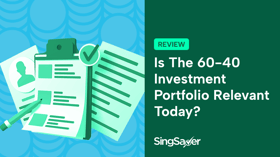Analysts have been warning about an impending recession since late 2021. To safeguard your finances, the key is to stay the course, diversify your investment portfolio, and protect your retirement savings. Here’s how to do that.
Many economic forecasters are saying that it’s time to start preparing for a potential recession on the way—even as soon as next year.
Due to rising inflation, the Federal Reserve's steady raising of interest rates, the ongoing pandemic, as well as the war in Ukraine, the outlook for the global economy is undeniably bleak. The resulting volatility in the plunging stock market has also exacerbated the situation.
However, it’s not too late to start preparing your portfolio for a potential recession. Instead of having heart palpitations over fluctuating stock prices, here’s what you can do.
Remember why you chose your investments in the first place
During a recession, your first response might be to see which of your investments are in the red or have suffered the most losses, and consider whether to sell them. This knee-jerk reaction will only have you locking in the losses if you act on them. Avoid this common investment mistake by remembering why you decided to invest in those assets in the first place.
Do your research to validate if the circumstances surrounding the company’s growth and intrinsic value have changed. Hold on to the faith that you had when you first bought them instead of giving in to your emotions. If you do decide to buy a stock, the same principle of information applies—be aware of the risks and make an informed decision.
Luke Lim, Managing Director of PhillipCapital says, “Ideally one should base the decision on the earnings and dividends that can be generated from the company, and not on the expectation that you can potentially sell at a profit. Amidst the growing trend of DIY investing among young investors, Luke points out that “picking individual stocks is time consuming and requires expertise that not many retail investors would have”.
“A better approach to making investment choices would be how to choose the right portfolio, specifically to have a diversified investment portfolio, especially with products such as low-cost ETFs. Choosing a diversified portfolio means to include a variety of different asset types into your portfolio. This would ensure that one asset or asset class's performance does not affect the entire portfolio, thus reducing your portfolio's risk. ETFs are a good way to diversify one’s portfolio as they are a basket of securities which can contain investments such as stocks and bonds, as opposed to stocks of one single company, and these typically have a strict screening process to be included.”
Hold off on rebalancing
It’s usually a good idea to rebalance your portfolio, so you don’t hold on to poor investments or remain with the same asset allocation that no longer works for you. However, in a market sell-off, it’s better to hold on to your investments than panic-selling and buying investments left and right to switch up your asset allocation. Selling your investments during a market low is one of the worst things to do as it pretty much guarantees losses.
Rebalance only when the market has evened out over time. And when you do rebalance down the road, take stock of the emotions you felt during the financial crisis. Being aware of your knee-jerk response to the recent market fluctuations will give you an idea of how you should allocate your investments. If you weren’t able to stomach the volatility, then your portfolio should be a more conservative one with more bonds than stocks so that you feel secure and confident enough to weather financial storms.
If you’re not confident in deciding what to invest in, consider a robo-advisor. It can help determine your risk tolerance, then pick and manage your investments on your behalf, so you don’t have to do the time-consuming work of tracking every stock you buy.
Consider buying the dip
Instead of panicking when the market dips, consider if you’re financially stable enough to buy during a downturn.
It’s near impossible to time the market, so you can’t predict when stocks will be at their lowest. However, you can buy the stocks you’ve been eyeing for a while or pick out the ones you believe have the potential to recover well. If their prices fall below the threshold that you’re comfortable with, then you may find yourself snagging a bargain. Go for assets that help to diversify your portfolio and your future self might thank you.
However, if you're facing impending unemployment or are financially strapped, now is not the time to bet on a volatile market. Shore up your emergency fund rather than make a risky investment. Remember: only buy the dip if you’re able to lose that money.
Invest in essentials
Recession-friendly investments such as consumer staples are safe assets for any investment portfolio as they are essential even during a recession.
In fact, the consumer staples sector has historically outperformed other industries like tech and innovation during recessions, because 1) the consumer staples industry provides products that consumers need regardless of the economic climate, 2) tech and research companies may cut spending during a recession, as evident during the recent spate of tech layoffs.
Companies that can withstand economic downturns include utility companies like Singtel, Starhub and Sembcorp Industries as there is still a demand for telco services, water, gas, and electricity even in a recession.
Luke added, “Old economy stocks such as fossil fuel have been underinvested over the past decade. This is due to more investors being concerned with ESG investing, and capital shifting to the new economy. This lack of investment has meant that despite the high commodity prices, there is no supply response or new capacity being built for more fuel, food and metals. As a result, these elevated commodity prices could be expected to linger for the next few years”.
Likewise, supermarkets are also a defensive investment as grocers are usually resilient in economic downturns. Think how well Sheng Siong fared during the pandemic.
You don’t have to move your whole portfolio towards these assets. However, it could be a good idea to add some consumer staples or utilities ETFs to add more stability to your portfolio when the economy is feeling uncertain.
Be sure to research every company and industry you’re planning to invest in, no matter how ‘recession-proof’ everyone says it is.
Stay the course
It might be scary to see your investments plunging or in the red, and to read all the doom-and-gloom headlines about an economy heading for disaster. But try not to panic and act on your emotions. Remember: the best way to weather a recession is by staying invested. Investors who see their investments through bear markets tend to see their portfolios recover completely in time, while those who pull out prematurely almost always lose out.
In order to stay invested, it’s crucial to have a solid emergency fund that can cover you amply should you find yourself in an emergency situation like losing your job. That way, you won’t be forced to dip into your investment fund or sell your assets. Aim to have three to six months’ worth of living expenses as your emergency fund in your savings account—more if necessary, depending on your individual situation.
Invest in yourself
A recession calls for more prudence in handling your money, so take a good look at your lifestyle expenditure and identify ways to streamline it. Monitor your cash flows and spending habits to optimise your finances and maybe hold off on that luxury item you’re itching to buy just ‘cause. Also, if possible, pay off all your debt or at least make sure you don’t have any outstanding debt that you’re unable to take on.
Once you have basic financial health down, you can work on expanding or sharpening your skill set. In a recession, companies tend to take cost-cutting measures such as laying off redundant workers, so looking for ways to value-add to the company you’re working for is a good way to safeguard your career.
Start managing and saving money like a pro with SingSaver’s weekly financial roundups! We dole out easy-to-follow money-saving tips, the latest financial trends and the hottest promotions every week, right into your inbox. This is one mailer you don’t want to miss.
Sign up today to receive our exclusive free investing guide for beginners!
Read these next:
Managing Your Investments – When To Hold On And When To Let Go
9 Ways to Hedge Against Inflation with Investing
The Best Investment Strategies to Apply At Each Decade of Your Life
What Is Emotional Investing And How To Avoid It
Take This Before You Go: A Must-Read Guide For Budding Investors
Similar articles
The Newbie’s Guide to Investing in Emerging Markets Stocks
How to Survive a Recession in Singapore Without Losing Money
How Will Economic Sanctions on Russia Impact Your Investments?
11 Things You Shouldn’t Do Before or During a Recession
How To Prepare For A Recession As A Working Adult In Singapore?
Best Places To Put Your Money During A Recession
The MAS Just Made Saving for Retirement a LOT Easier
What To Do During A Recession: How To Safeguard Your Investment Portfolio











